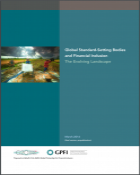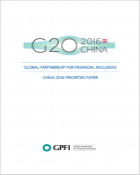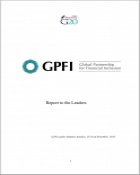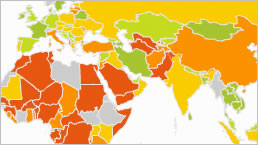Publications
Report | May 16, 2016
The Global Partnership for Financial Inclusion 2016 Work Plan presents the key outcomes for the GPFI during 2016. Consistent with the theme of China’s G20 Presidency in 2016, “Towards the Innovative, Invigorated, Interconnected and Inclusive World Economy,” the GPFI will continue to work on former Presidencies’ agenda items and support the implementation of the FIAP with particular focuses on:
Digital Financial Inclusion: Innovation, Regulation and Supervision;
Data and Indicators;
Reaching the Last Mile: Rural Areas, the Poor, the Youth and the Elderly;
Financial Consumer Protection and Financial Literacy;
SME Finance: Diversified Financing Channels.
It includes a timeline of GPFI events as well. The GPFI organizes its work through four Subgroups. You can find their individual Work Plans below:
White paper | Feb 29, 2016
The March 2016 GPFI White Paper, Global Standard-Setting Bodies and Financial Inclusion: The Evolving Landscape, builds on the considerable progress in recent years in integrating financial inclusion into the work of global standard-setting bodies (SSBs) and looks forward, examining new challenges in the changing landscape of the digitization of financial services.
In just the few years since the October 2011 GPFI White Paper, Standard-Setting and Financial Inclusion for the Poor—Toward Proportionate Standards and Guidance, recognition has grown as to the impact of the global financial sector standard-setting bodies (SSBs) on who gets access to what range and quality of formal financial services and at what cost. During this period, the SSBs have acted on most of the observations and recommendations in the first GPFI White Paper. There is still far to go, but the advances are noteworthy. Appreciation has also grown as to the important role that digitization of financial services plays in reaching financially excluded and underserved customers, and the implications of this development for the SSBs.
Report | Jan 29, 2016
This document outlines Global Partnership for Financial Inclusion (GPFI) priorities during China’s G20 Presidency for 2016.
Consistent with the theme of China’s G20 Presidency in 2016, “Towards the Innovative, Invigorated, Interconnected and Inclusive World Economy”, the GPFI will continue to work on former Presidencies’ agenda items and support the implementation of the G20 Financial Inclusion Action Plan with particular focuses on:
Digital Financial Inclusion: Innovation, Supervision and Regulation;
Data and Indicators;
Reaching the Last Mile: Rural Areas, the Poor, the Youth and the Elderly;
Financial Consumer Protection and Financial Literacy;
SME Finance: Diversified Financing Channels.
Report | Nov 24, 2015
This report summarizes GPFI activities throughout the end of 2014 and nine months of 2015, presents the main achievements under the Turkish Presidency and describes the outlook for the rest of 2015 and into the start of the Chinese Presidency.
Report | Nov 19, 2015
The report, Inclusive Growth and Development: 2015 Antalya Development Roadmap, highlights the work of the G20 Development Working Group (DWG) in 2015 and looks ahead to 2016.
In 2015, the DWG and the Global Partnership for Financial Inclusion (GPFI) collaborated with the Investment and Infrastructure Working Group (IIWG) on the G20 Joint Action Plan on SME Financing. The new GPFI private sector engagement strategy and the SME Finance Forum, which will evolve into a global membership body for private and public financial institutions, will be central instruments for the private sector engagement, the report says.
In addition, the GPFI worked on uncovering innovative ways to finance the agricultural sector in developing countries, in order to mainstream food security in financial inclusion, the report states, and developed a Consultation Document for the 2nd edition of the GPFI White Paper “Global Standard-Setting Bodies and Financial Inclusion for the Poor- The Evolving Landscape,” to be released with the active participation of the standard-setting bodies’ secretariats.
Report | Nov 19, 2015
G20 Leaders, in the Antalya Action Plan, said they "are taking collective actions to promote financing for SMEs, especially in emerging economies, by improving systems for credit reporting, lending against movable collateral, and insolvency reforms." In addition, they weclomed the launch of the SME Finance Forum’s global membership network, as well as the progress made in scaling-up support to SME finance in low income developing countries through new partnerships under the SME Finance Compact.
The Antalya Action Plan sets out the G20’s plan for decisive actions to strengthen the global economic recovery and foster strong, sustainable and balanced growth. Read the full report.
Report | Nov 19, 2015
The GPFI Markets and Payment Systems Subgroup requested the World Bank Group, the Better Than Cash Alliance and the Alliance for Financial Inclusion to provide an overview of those areas in the payments value chain where recent digital and business model innovations are opening up new possibilities, particularly in developing countries where the need for financial inclusion is the most acute. An analytical framework is suggested in the report, enabling the structured assessment of payment innovations supporting further supporting financial inclusion.
Report | Nov 19, 2015
Under the Turkish Presidency, the GPFI through its implementing partners, the World Bank Group in collaboration with the Alliance for Financial Inclusion, organized a one-day workshop in Antalya, September 2015 on SME Finance. This report highlights challenges, solutions and recommendations that emerged from the workshop.
In an effort to promote SME finance policies and approaches that spur economic growth, the G20 GPFI announced the SME Finance Compact in 2012. The GPFI announced an SME Finance Compact in 2012, to promote the development of innovative models and approaches to address the specific challenges and constraints faced by low income developing countries (LIDCs) with regard to SME finance.
Report | Nov 19, 2015
This report summarizes GPFI activities throughout the end of 2014 and nine months of 2015, presents the main achievements under the Turkish Presidency and describes the outlook for the rest of 2015 and into the start of the Chinese Presidency.
Report | Nov 19, 2015
At the request of the GPFI Markets and Payment Systems Subgroup, the International Fund for Agricultural Development, supported by the World Bank Group, provided an overview of the nexus between remittances and financial inclusion. The report, endorsed by G20 Leaders in November 2015 in Antalya, categorizes the trends in leveraging remittances to enhance financial inclusion and stresses the importance of maximising the economic impact of remittances on sustainable development.





